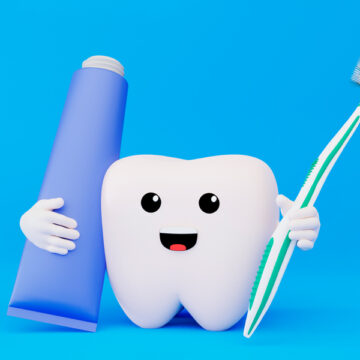Baby Dental Care
Many parents are surprised that we recommend a baby dentist to provide a dental check-up for children by the time they are one year old or within six months of the first tooth erupting. They sometimes ask why this is necessary when their child has no or very few teeth. At Bay Area Kids Dentist, our infant dentists know that great smiles start early.
Unfortunately, children can develop tooth decay as early as age three from taking naps with a bottle in their mouth or continuously nursing from their mother. The sooner you start bringing your baby in for regular dental check-ups, the easier it is for us to detect and treat any dental problems.
How to Care for Your Baby’s Teeth at Home
It’s never too early to start an oral care routine, even if your baby doesn’t have any teeth yet. In that case, you can use a clean, damp cloth to clean the gums. When the primary teeth start coming in, place a pea-sized amount of toothpaste on a baby toothbrush to get the teeth clean. Our dentists recommend continuing to help your child with brushing until approximately age seven. Try to limit the amount of time your child has a bottle and don’t put him or her down for a nap with one.
The entire staff at Bay Area Kids Dentist is happy to answer any additional questions you have about caring for your young child’s oral hygiene.
Baby Tooth Eruption Schedule
Teeth vary in size, shape and their location in the jaws. These differences enable teeth to work together to help you chew, speak and smile. They also help give your face its shape and form. At birth people usually have 20 baby (primary) teeth, which start to come in (erupt) at about 6 months of age.

Problems We Treat
- Emergency Tooth Extraction
- Severe Toothache
- Loose or Dislodged Tooth
- Bleeding Gums
- Knocked Out Tooth
- Infection or Swelling in the Mouth
- Jaw Pain
- Chipped or Cracked Tooth
FAQs
Start brushing as soon as the very first tooth appears, usually around 6 months. Utilize a soft-bristled toothbrush and a tiny smear of fluoride toothpaste.
Help your child brush their teeth twice a day with fluoride toothpaste, limit sugary snacks and drinks, and visit the dentist periodically for cleanings and check-ups.
Watch for signs such as tooth pain, sensitivity to very hot or cold temperatures, visible holes, or dark spots. Regular dental visits help catch cavities early.
Untreated cavities may lead to pain, infection, and may affect how adult teeth come in. It’s important to treat them, even in baby teeth.
It could be a cavity, tooth injury, gum infection, or something stuck between the teeth. A dental checkup can find the cause.
Sudden pain may be caused by a cavity, a cracked tooth, an abscess, or even sinus pressure. It’s best to have a dentist examine it.
Most babies get their first tooth between 6 to 10 months, starting with the lower front teeth.
Bleeding gums can be caused due to brushing too hard, plaque buildup, or the early stages of gum disease. Ensure your child brushes their teeth gently and regularly.
Persistent bad breath can indicate poor brushing, cavities, gum issues, dry mouth, or even allergies. A dental checkup can help find the reason.
Thumb-sucking is normal in babies, but it can affect tooth alignment if it continues past age 4. Consult your dentist if you are concerned.
If it’s a baby tooth, don’t try to put it back—call us for advice. If it’s a permanent tooth, gently rinse it and try to place it back in the socket or in milk, and come to the dentist right away.
Nighttime grinding (bruxism) is common in kids and can be caused due to stress, misaligned teeth, or sleep issues. We can evaluate if treatment is needed.
Sugary snacks, sticky candies, soda, and even dried fruits can lead to cavities. Encourage water, fruits, and crunchy veggies instead.
Not always, but it can be an early sign of gum disease or poor oral hygiene. Regular brushing and checkups help keep gums healthy.
Many kids start orthodontic evaluation around age 7. Early checks help plan for braces if needed.
Yes, but only for kids over age 6 who can spit it out. Choose child-friendly mouthwashes with fluoride.



















